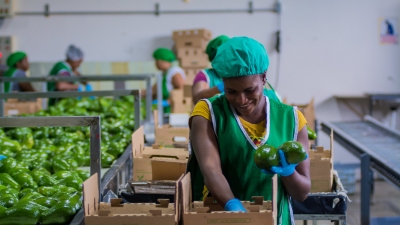The Caribbean’s agricultural transformation
 Avocado processing plant
Avocado processing plantFAO and the CDB are committed to helping Caribbean countries reposition agriculture toward more inclusive growth, prosperity and sustainability.
A study initiated by the Investment Centre on the state of food and agriculture in the Caribbean identified key agricultural trends in CDB borrowing member countries, as well as investment opportunities.
It examined the agricultural transformation currently happening in the Caribbean – the evolution, for example, from classic export crops like sugar and bananas to irrigated fruits and vegetables. Most of the region’s countries are island nations, so agricultural trade – both export promotion and import substitution – is particularly important for their development.
Given that hurricanes, tropical storms, drought and erosion are huge challenges for the Caribbean, the study looked at the impact of climate change and natural hazards on the sector. It also explored areas where agriculture can reinvent itself, like linking up with the region’s booming tourism industry and creating new jobs, especially for youth. The study was a collaborative effort from the start.
The Investment Centre worked closely with FAO’s Subregional Office for the Caribbean and FAO’s Agricultural Development Economics Division. Local stakeholders were also involved in the process, including the University of West Indies – the Caribbean’s top academic organization – and institutions such as the Organization of Eastern Caribbean States and the Caribbean Community.
While the study focused specifically on Jamaica, Guyana, Grenada and Haiti, it looked at agricultural trends across the entire region. The results have now fed into FAO’s inputs to the Bank’s new agricultural strategy, currently under preparation.
The strategy, expected to be launched this year, not only covers hard and soft investments in agriculture but focuses on five cross-cutting areas – gender, youth, nutrition, good governance and information and communication technologies, including digital agriculture.
